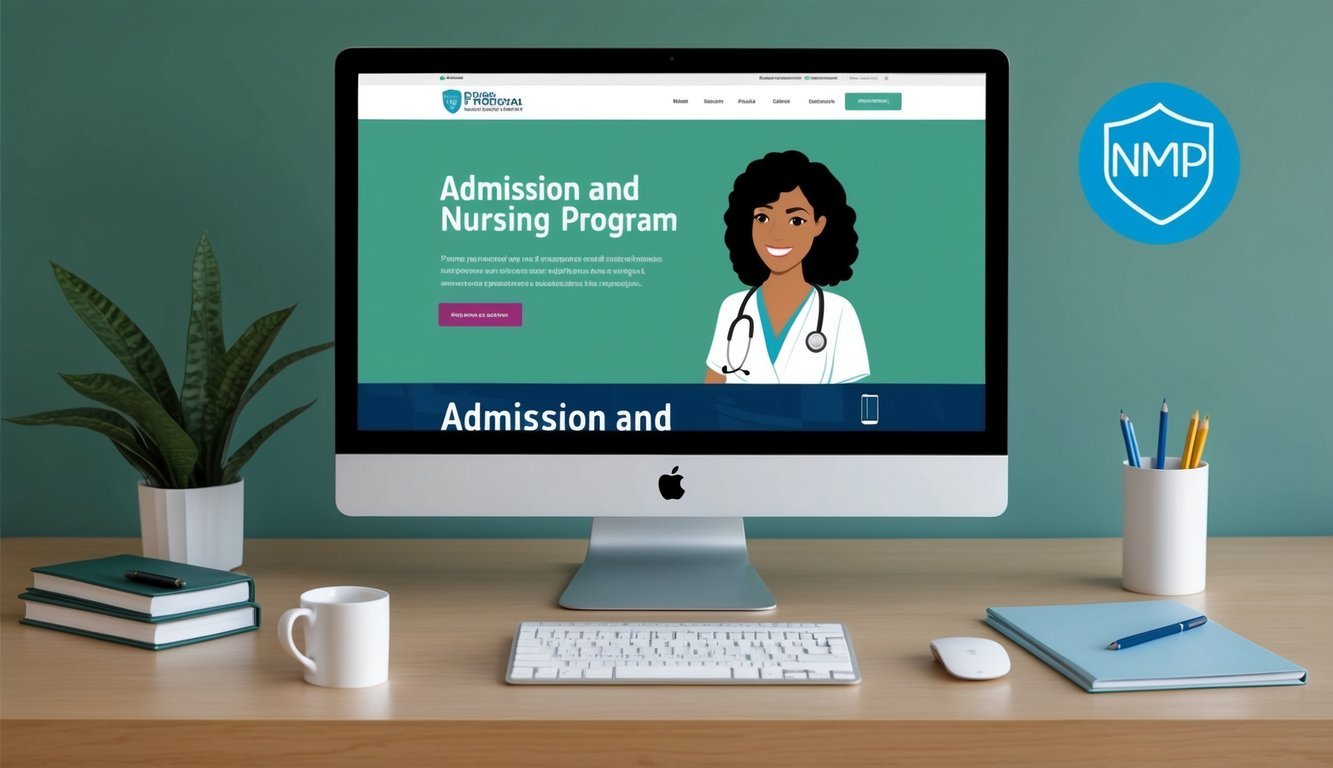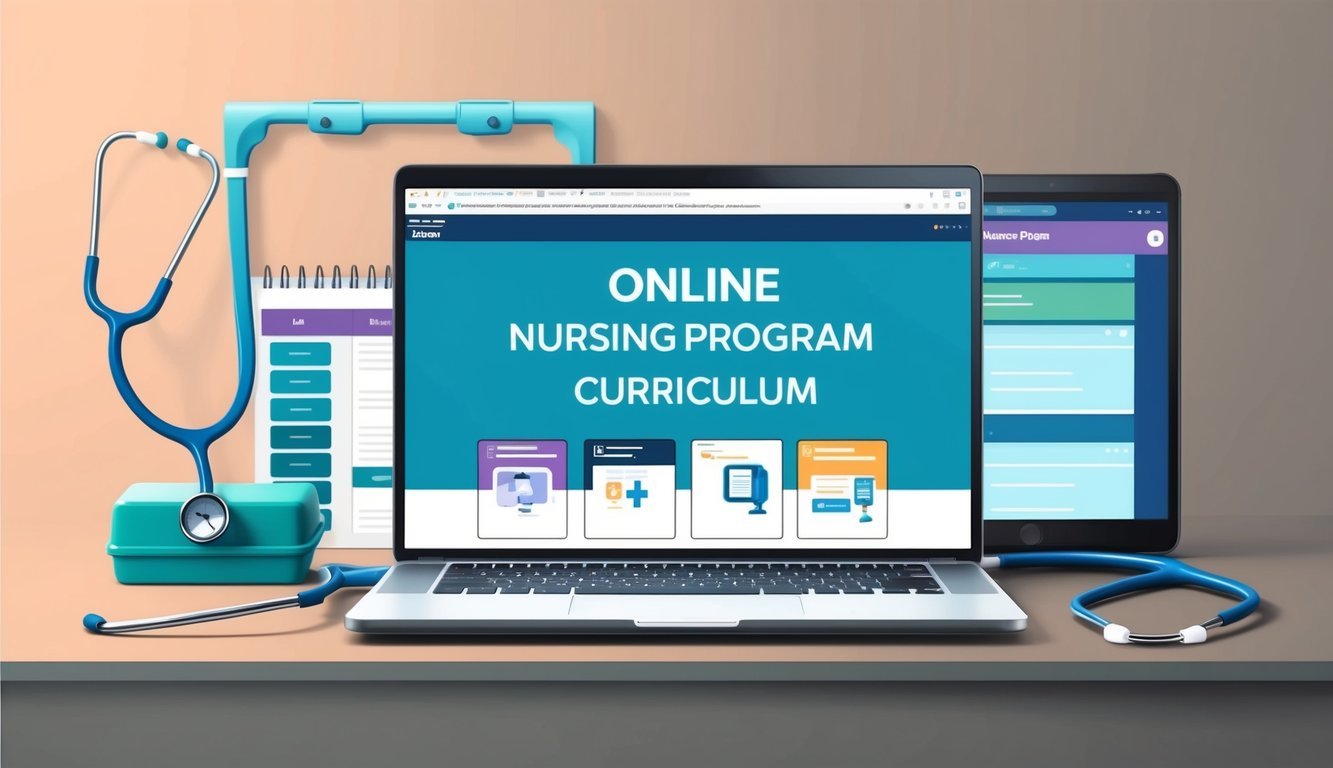Online nursing programs are becoming an increasingly popular choice for those looking to advance their careers in nursing education.
These programs offer the flexibility you need to balance your studies with personal and professional commitments while equipping you with essential skills to become a registered nurse.
With various options, from associates to master’s degrees, you can find a program that fits your career goals.
As healthcare evolves, so does the demand for qualified nurses.
Pursuing an online nursing program not only enhances your education but also prepares you for the challenges of modern healthcare environments.
Many programs are designed to provide hands-on experiences through simulations and clinical placements, ensuring you gain practical experience alongside theoretical knowledge.
Exploring your options in online nursing education can lead to rewarding career opportunities.
Whether you’re entering the field for the first time or looking to specialize further, these programs can provide you with the credentials needed to succeed in your nursing career.
For a detailed look at some of the top online nursing programs, you can check out platforms like SNHU and WGU.
Exploring Online Nursing Programs
When considering online nursing programs, it is essential to understand the various types of nursing degrees available, the formats of these programs, and the importance of accreditation.
Each aspect plays a critical role in guiding your educational journey and future career.
Types of Nursing Degrees
Online nursing programs offer a variety of degree options, catering to different career paths and educational backgrounds.
The most common degrees include:
-
Associate Degree in Nursing (ADN): A two-year program that prepares you to become a registered nurse (RN).
-
Bachelor of Science in Nursing (BSN): A four-year degree that expands your knowledge of nursing fundamentals and practice, often required for leadership roles.
-
Master of Science in Nursing (MSN): This program usually takes two years post-BSN and allows you to specialize in areas such as nurse practitioner or nurse educator.
-
Doctor of Nursing Practice (DNP): A terminal degree that focuses on advanced clinical practice and leadership in healthcare.
Understanding these degrees helps you choose the right path that aligns with your career goals.
Explore programs like accelerated BSN programs for quick entry into the nursing field.
Online Nursing Degree Formats
Online nursing programs come in several formats to accommodate diverse learning preferences and schedules.
Common formats include:
-
Fully Online Programs: Complete coursework entirely through online platforms, providing flexibility.
-
Hybrid Programs: Combine online classes with on-campus clinical requirements.
-
Accelerated Programs: Designed for those with prior degrees, these programs allow you to earn your BSN or MSN in a shorter time frame.
You can choose from options like RN-to-BSN or LPN to RN bridge programs, which are tailored for licensed nurses looking to advance their education efficiently.
Investigate the specific format that aligns with your lifestyle and educational needs.
Understanding Accreditation
Accreditation is crucial in ensuring that your nursing program meets high academic standards.
Attending an accredited program impacts your eligibility for financial aid and can affect your employability.
-
Institutional Accreditation: This applies to the school itself, ensuring it meets quality education standards.
-
Program Accreditation: Specifically relevant to nursing programs, it guarantees that the curriculum is aligned with professional requirements.
Look for programs accredited by recognized bodies such as the Commission on Collegiate Nursing Education (CCNE) or the Accreditation Commission for Education in Nursing (ACEN).
Researching these accreditations will help secure your future in the nursing profession.
Admission and Enrollment Procedures

Navigating the admission and enrollment process for online nursing programs can be intricate.
Understanding the eligibility criteria, application process, and required supporting documents is essential for a smooth entry into nursing education.
Eligibility Criteria
To enroll in an online nursing program, you typically need a high school diploma or GED certificate.
Many programs also specify prerequisites in math and science, ensuring you have the foundational knowledge necessary for nursing coursework.
Most Bachelor of Science in Nursing (BSN) programs do not require prior nursing experience.
However, some schools may prefer candidates who have completed relevant coursework or have volunteer experience in healthcare settings.
Be sure to check the specific requirements for each program you are considering.
Online Application Process
The online application process usually involves several key steps.
First, you must complete the program’s online application form, providing your personal information and educational history.
You’ll typically need to create an account on the school’s application portal.
As part of the application, you may also be required to pay a non-refundable application fee.
After submitting your application, you’ll often receive confirmation via email.
This process varies by institution, so refer to your chosen program’s guidelines for specifics.
Supporting Documents and Deadlines
In addition to the application form, several supporting documents are usually necessary.
These may include:
- Transcripts: Official transcripts from all post-secondary institutions attended.
- Letters of Recommendation: Typically, two to three letters from educators or employers.
- Personal Statement: An essay detailing your motivation for pursuing nursing.
It is critical to pay attention to application deadlines, which can vary significantly by program.
Some institutions have rolling admissions, while others have fixed deadlines.
Make sure to confirm these dates on the program’s website to ensure timely submission of your application and supporting documents.
Financial Considerations

When evaluating online nursing programs, understanding financial implications is crucial.
This includes tuition costs, available financial aid, and additional expenses you may encounter during your studies.
Tuition Costs and Fees
Tuition costs for online nursing programs can vary widely based on the institution and the program type.
The cost per credit hour typically ranges from $404 to $1,210, depending on the school and your degree level.
For instance, an RN-to-BSN program generally requires around 30 to 40 credit hours for completion.
Therefore, the total cost could be significant, especially if you choose a more expensive institution.
It’s essential to review each program’s fee structure, which may include registration fees, technology fees, and costs for specific online resources.
| Program Type | Credit Hours Required | Estimated Cost per Credit Hour | Total Estimated Cost |
|---|---|---|---|
| RN-to-BSN | 30-40 | $404 – $1,210 | Varies |
Financial Aid and Scholarships
Various financial aid options and scholarships are available to nursing students.
You may qualify for federal student aid through FAFSA, which can provide grants, loans, or work-study opportunities.
In addition, many institutions offer institutional scholarships specifically for nursing students.
These can dramatically lower your overall tuition costs.
Make sure to explore options like tuition discounts for early payment or discounts for community service.
Research individual schools for their specific financial aid packages and apply for scholarships early to maximize your funding opportunities.
Expenses Beyond Tuition
In addition to tuition, you should factor in other expenses that can arise during your nursing program.
These may include:
- Textbooks and Supplies: Costs for required reading materials can add up quickly. Budget for approximately $100 to $600 per semester.
- Clinical Fees: If your program requires clinical hours, you might incur additional fees related to placement or equipment.
- Technology Costs: A reliable computer and internet connection are essential for online learning, which can add another $500+ to your overall expenses.
Taking these expenses into account will help you create a comprehensive budget for your nursing education.
Curriculum and Clinical Practice

Your online nursing program will emphasize a comprehensive curriculum designed to equip you with essential skills for advanced nursing roles.
It integrates core coursework with hands-on clinical practice and opportunities for specialization.
Here’s a closer look at the components of the curriculum and its clinical applications.
Core Nursing Curriculum
The core nursing curriculum consists of foundational courses that are critical for your development as a nurse.
You will engage in classes that cover topics such as:
- Patient Care: Focusing on evidence-based approaches to treatment and care strategies.
- Mental Health Nursing: Addressing the psychological aspects of patient care, equipping you to manage a diverse patient population.
- Community Health Nursing: Exploring public health principles and the role of nurses in community settings.
These courses are designed to deepen your understanding of nursing theories, nursing research, and practices essential for delivering high-quality care.
Through a mix of theoretical and practical learning, you will become prepared to tackle real-world challenges in healthcare.
Clinical Hours and Experience
Clinical hours are a crucial part of your nursing education, providing you with the opportunity to apply theoretical knowledge in real healthcare settings.
Many online nursing programs, such as the Doctor of Nursing Practice programs, require a specific number of clinical hours to ensure you gain hands-on experience.
You will participate in various clinical placements that may include hospitals, clinics, and community health organizations.
Here’s a typical breakdown of clinical hours:
| Setting | Hours |
|---|---|
| Hospital Clinicals | 100+ hours |
| Community Health Settings | 50-80 hours |
| Specialized Care Facilities | 40-60 hours |
These experiences are critical for honing your practical skills and preparing you for patient interactions.
Specialization and Elective Courses
In addition to core requirements, you have the opportunity to choose electives that align with your career aspirations.
Specialization options often include:
- Nursing Education: Prepare to teach future nurses.
- Healthcare Administration: Focus on the operational aspects of healthcare institutions.
- Nursing Informatics: Learn to integrate technology in patient care.
These courses allow you to tailor your education to specific interests, enhancing your expertise in areas such as evidence-based practice and leadership within your nursing career.
You can find programs offering these electives via respected institutions like Georgetown University.
This specialized approach not only broadens your knowledge but also makes you more competitive in the healthcare job market.
Career Advancement and Professional Growth
In today’s dynamic healthcare environment, pursuing online nursing programs can significantly enhance your career opportunities.
These programs focus on providing essential skills and knowledge for professional growth in nursing.
Consider the following aspects that contribute to your advancement in this field.
Job Opportunities and Outlook
As a registered nurse, you can expect a robust job market.
The demand for healthcare professionals continues to rise, especially for those with advanced qualifications.
The U.S. Bureau of Labor Statistics projects a 6% job growth for registered nurses from 2021 to 2031.
| Nursing Role | Projected Job Growth |
|---|---|
| Registered Nurse | 6% |
| Nurse Practitioner | 28% |
| Nurse Anesthetist | 13% |
| Nursing Leadership | 11% |
The increasing complexities in healthcare systems open many doors for you, particularly in specialized areas.
Understanding the job landscape can help you target roles that best match your interests and fortify your career trajectory.
Continuing Education and Specializations
Continuing education is vital for registered nurses.
Online programs often offer various specializations, which can set you apart from your peers.
Options include:
- Clinical Nurse Specialist
- Nurse Educator
- Nurse Leader
- Nurse Practitioner
Specializing allows you to focus on specific patient populations or healthcare issues.
This focus leads to greater job satisfaction and can improve patient outcomes.
Furthermore, many employers offer incentives for continued education, making it a worthwhile investment in your future.
Transitioning into Advanced Roles
Transitioning into advanced practice roles can significantly impact your nursing career.
As you pursue online nursing education, consider options such as becoming a Nurse Practitioner or a Nurse Anesthetist.
These roles come with increased responsibilities and higher salaries.
The skills you acquire can help you step into positions of nursing leadership, where you can influence care delivery and policy.
Engaging in leadership training can prepare you for these roles effectively.
Many online programs offer tracks that include management and leadership skills tailored for healthcare environments.
By pursuing these advanced degrees and certifications, you position yourself for greater responsibilities and rewards in your nursing career.
Assessing Quality and Performance Indicators
When considering online nursing programs, it’s essential to evaluate their quality and performance indicators.
Key factors to consider include graduation and retention rates, NCLEX examination success, and the student-faculty ratio.
These metrics can significantly impact your educational experience and future career as a nurse.
Graduation and Retention Rates
Graduation rates reflect the percentage of students who complete the program within a specified timeframe.
High graduation rates indicate effective program support and student satisfaction.
Retention rates reveal how many students remain in the program until completion.
For instance, many successful programs report graduation rates of 70% or higher.
A higher retention rate often correlates with robust support services such as academic advising and mentorship.
| Program | Graduation Rate | Retention Rate |
|---|---|---|
| Southern New Hampshire University | 78% | 85% |
| Western Governors University | 75% | 80% |
NCLEX Examination Success
The NCLEX-RN pass rate is another critical performance indicator.
This rate measures the percentage of graduates who pass the exam on their first attempt.
A program with a high NCLEX pass rate demonstrates that its curriculum effectively prepares students for clinical practice.
Look for programs with pass rates above 90%.
Continuing support for students, including test preparation resources, can enhance success.
| Program | NCLEX-RN Pass Rate |
|---|---|
| Southern New Hampshire University | 91% |
| Western Governors University | 95% |
Student-Faculty Ratio and Instruction Quality
The student-faculty ratio plays a vital role in the learning environment.
A lower ratio typically enables more personalized attention and support from faculty.
Strong engagement between students and instructors can lead to improved academic performance.
Aim for programs with a student-faculty ratio of 1:15 or lower.
Quality of instruction is also paramount.
Investigate faculty qualifications, teaching methods, and availability to ensure a supportive and effective learning experience.
| Program | Student-Faculty Ratio | Faculty Qualifications |
|---|---|---|
| Southern New Hampshire University | 1:12 | PhD, DNP, well-experienced |
| Western Governors University | 1:10 | DNP, extensive clinical experience |

